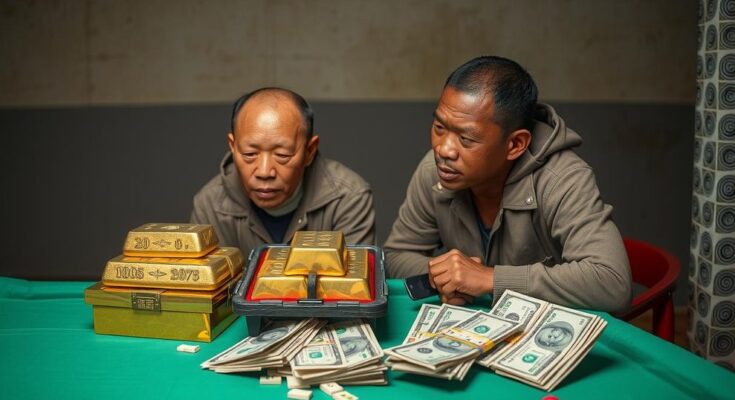Three Chinese nationals were arrested in the Democratic Republic of Congo with 12 gold bars and $800,000 in cash. The operation was kept secret due to previous releases of suspects involved in illegal mining. Eastern DR Congo’s wealth in minerals has been exploited by foreign groups, contributing to regional instability and conflict, with militia groups often controlling mines. The situation is complicated by international legal actions regarding ‘blood minerals’ and their impact on violence and forced labor.
Three Chinese nationals were apprehended in the eastern region of the Democratic Republic of Congo (DR Congo) while in possession of 12 gold bars and $800,000 in cash. The Governor of South Kivu province, Jean Jacques Purusi, indicated that the contraband was hidden beneath the vehicle seats during transit. The operation was conducted discreetly following the release of a previous group of Chinese individuals charged with operating an illegal gold mine in the area.
DR Congo is known for its significant mineral deposits, including gold and diamonds, which have been exploited by foreign entities since the colonial era. This exploitation is a major contributing factor to the persistent instability in the region over the past three decades. Militia groups maintain control over many mining operations, with leaders profiting from sales to intermediaries.
Governor Purusi noted that some dealers involved have established strong ties with influential figures in the capital, Kinshasa, necessitating secrecy surrounding these latest arrests. The arrests were enacted following a tip-off, with the search of the vehicle in Walungu leading to the discovery of the hidden gold and cash. Previously, the governor expressed dismay at the release of 17 Chinese nationals involved in illegal mining, underscoring a significant challenge in reforming the country’s mineral sector.
The situation remains tense as armed conflict persists in the adjacent North Kivu province, where a rebel faction, allegedly supported by Rwanda, has gained substantial control over territories. The Congolese government is currently pursuing legal action against Apple for purported utilization of minerals sourced from conflict zones, which, according to official sources, finance violent militias and contribute to human rights violations, including forced labor.
The Democratic Republic of Congo possesses immense mineral wealth, including gold and diamonds, which has been subject to continual exploitation by foreign entities. Historically, the region has experienced substantial instability as a consequence of this exploitation, especially over the last 30 years characterized by the dominance of militia groups in the mining sector. These groups often maintain strong connections with influential political figures, complicating efforts to regulate the industry. Recent developments, including the arrests of Chinese nationals, highlight the ongoing challenges the Congolese government faces in its efforts to combat illegal mining and the illegal exportation of its natural resources, which has sparked international controversy and legal action against major corporations.
The arrest of the three Chinese nationals, accompanied by gold bars and cash, showcases the ongoing battle against illegal mining activities in the Democratic Republic of Congo. The region’s considerable mineral resources have been a source of conflict and instability, exacerbated by ties between militia groups and influential individuals. As the Congolese government makes efforts to regulate the sector, the international community is urged to address the implications of resource exploitation and its contribution to violence and human rights infractions.
Original Source: www.bbc.com




